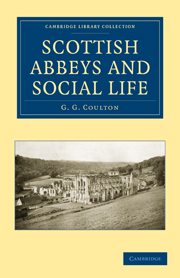Book contents
- Frontmatter
- Contents
- LIST OF ILLUSTRATIONS
- Preface
- Chapter I Celtic Monachism
- Chapter II The Monastic Rules
- Chapter III Monastic Revenues
- Chapter IV How Endowments Came (I)
- Chapter V How Endowments Came (II)
- Chapter VI Monks and Parishes (I)
- Chapter VII Monks and Parishes (II)
- Chapter VIII Charity (I)
- Chapter IX Charity (II)
- Chapter X Monk and Peasant (I)
- Chapter XI Monk and Peasant (II)
- Chapter XII Monastic Housekeeping
- Chapter XIII Church and Scriptorium
- Chapter XIV The Monastic Chronicler
- Chapter XV Schools
- Chapter XVI Art and Learning
- Chapter XVII Professions and Business
- Chapter XVIII Visitation (I)
- Chapter XIX Visitation (II)
- Chapter XX A Voice from the Cloister
- Chapter XXI Conclusion
- Appendixes
- List of Authorities
- Index
Chapter VIII - Charity (I)
Published online by Cambridge University Press: 05 August 2011
- Frontmatter
- Contents
- LIST OF ILLUSTRATIONS
- Preface
- Chapter I Celtic Monachism
- Chapter II The Monastic Rules
- Chapter III Monastic Revenues
- Chapter IV How Endowments Came (I)
- Chapter V How Endowments Came (II)
- Chapter VI Monks and Parishes (I)
- Chapter VII Monks and Parishes (II)
- Chapter VIII Charity (I)
- Chapter IX Charity (II)
- Chapter X Monk and Peasant (I)
- Chapter XI Monk and Peasant (II)
- Chapter XII Monastic Housekeeping
- Chapter XIII Church and Scriptorium
- Chapter XIV The Monastic Chronicler
- Chapter XV Schools
- Chapter XVI Art and Learning
- Chapter XVII Professions and Business
- Chapter XVIII Visitation (I)
- Chapter XIX Visitation (II)
- Chapter XX A Voice from the Cloister
- Chapter XXI Conclusion
- Appendixes
- List of Authorities
- Index
Summary
How, then, about monastic charities? These must certainly not be forgotten; they were enough to make the poor feel their loss very keenly whenever a beneficent abbot was succeeded by a grasping noble. But, in the first place, it must be remembered that this melancholy change had come about, for the majority at least of the monasteries, long before the Reformation. Scotland suffered perhaps more than any country in Europe from the so-called commendam system, by which the pope granted a rich abbey, or even a number of houses, to some absentee noble who scarcely deigned to perform priestly duties anywhere, and whose main relations with his titular abbey were to swallow nearly all the revenues, leaving the monks to get on as best they could upon a narrow allowance which was not always even paid with regularity. The Melrose Regality Records contain a typical case of this kind (vol. iii, pp. 217 ff.). In the thirteenth century, there may well have been eighty monks on the foundation, and certainly the buildings could have harboured so many. In 1556, the abbot in commendam was a bastard of James V; and the brethren formally refused to sign an extravagant lease by which he hoped to raise ready money. They put before him their reasons in writing, based upon his breach of his former promises to the brethren; he “displesandlie and with furiosite wald nocht reid the said articles, bot raif thame and cast thame doun at his [feet]”. Thereupon they drew them up again, with due notarial attestation.
- Type
- Chapter
- Information
- Scottish Abbeys and Social Life , pp. 100 - 109Publisher: Cambridge University PressPrint publication year: 2010First published in: 1933



